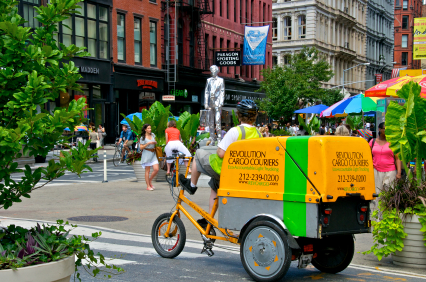
Cargo bikes are gaining momentum as a growing aspect of the sustainability movement. Making intra-city deliveries via peddle power appears to have nothing but a host of advantages and little-to-few drawbacks. Just to be sure, an extensive three-year study of the feasibility and impact of cargo bikes in urban centers is underway. The project, Cyclelogistics, spans more than 300 cities across 11 European countries and has already delivered promising results.
The study began by defining possible deliveries as those that are made in seven kilometers (4.6 miles) or less and weigh in at no more than 200 kilograms (440 pounds). This qualifies more than 50% of urban deliveries as being suitable for cargo bikes. Such a shift could bring about a 30% reduction in the current energy consumption associated with urban transport. Further reductions can be achieved by delivering even heavier loads on bikes with electrical assist.
The Cyclelogistics project aims to not only encourage industries to make the switch to cargo bike: it works to enable municipal services to get peddling too. Several cities have long made use of specially equipped bikes for sanitation services and postal deliveries but this represents only a fraction of the potential use of cargo bikes within municipalities.
Private citizens are also being encouraged to get out and ride. It has been estimated that half of all personal intercity trips include some type of cargo, such as groceries, traveling a distance less than five kilometers (3.2 miles). Customers at several of Europe’s largest grocery store chains are already finding options to rent a specially equipped bike or to hire a cargo bike delivery service among options for getting their groceries home safely.
Greater still are the number of retailers who are being made aware, thanks to Cyclelogistics, that bike lanes and parking spaces should be more readily available for bicyclists. An additional aim of the project is to educate retailers on the types of bicycle equipment they can sell in order to help citizens switch to cargo biking.
Making the transition to cargo bike even more appealing is the immense improvement in quality of life standards for urban dwellers. From reduced noise and improved air quality to greater pedestrian and biking infrastructure, outdoor activities only become more appealing in a bike-friendly city center. The human and environmental health benefits are legion, making the adoption of cargo bikes not only tantalizing but also essential.
Fun Fact:
Sustainable Investment Group has two team members that are avid bike riders. Jason, in Boulder, CO, does competitive road racing, cyclo-cross, and mountain biking. Alyson Laura was formerly a commuter cyclist whose typical daily route was from Decatur, GA to SIG’s office in Sandy Springs, GA.
One Last Thing
To learn a little more about the bike courier industry, check out this short video on TCB Courier, a bike courier company, based in San Francisco.
Sources:
Here is a helpful resource on bike safety from Bikemonk.
© 2013 Sustainable Investment Group (SIG). All rights reserved.



